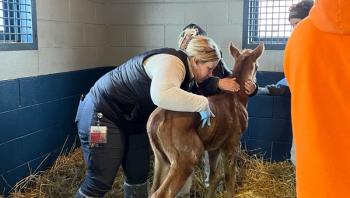
AVMA redrafts informed consent
Schaumburg, Ill. - The American Veterinary Medical Association replaced its "informed consent" policy last month to safeguard the profession from a guardianship distinction tied to human health care.
SCHAUMBURG, ILL. — The American Veterinary Medical Association replaced its "informed consent" policy last month to safeguard the profession from a guardianship distinction tied to human health care.
Agreements between owners and veterinarians should now read "owner consent," AVMA officials say.
The rewrite, approved by Executive Board members Nov. 16, overhauls an informed consent policy authored last April and removes those two words from the AVMA model practice act. The term "owner consent" replaces the language.
The change follows an Ohio appeals court ruling on a lawsuit against two DVMs. The decision explores informed consent as it pertains to veterinary medicine.
The new policy reflects leaders' reluctance to associate veterinarians with human medicine's use of the the term "guardian".
"This doctrine evolved in pediatric medicine from a cause of action involving the unauthorized touching of the body," explains Dr. Rosemary LoGuidice, staff consultant for the Council on Veterinary Services, which drafted the recommendation. "It is used to protect doctors from assault and battery charges, and there's a 'legal guardian' element. It's not a term appropriate for veterinary medicine."
Many AVMA leaders believe identifying owners as guardians could lead to defining animals as worth more than personal property in court cases. That evolution would mean more lawsuits against veterinarians and higher awards in malpractice cases, critics contend.
Ohio angle
Such expansion of the law was at risk in an Ohio appeals court's review of Lawrence v. Big Creek Veterinary Hospital. The appeal, which went to jury trial in September 2006, challenged the lower court's dismissal of malpractice charges against two veterinarians. While the trial court found the doctors did not practice below the standard of care involving a horse's treatment and the appeal verdict upheld that ruling, the three-judge panel said "informed consent" should be included in the duty of care.
It's a problem when informed consent, as a human health care doctrine, includes guardianship language, says James F. Wilson, DVM, JD. He considers the court's decision to drop that issue a near miss for veterinary medicine.
"While the court said there's no tort, this has never been codified, they also say informed consent should be covered. This could come back to bite veterinary medicine," says Wilson, a legal expert who advised AVMA on the matter.
Inside the policy
Now the three-paragraph policy replaces "clients" with "owners". Much like the previous version, it calls on practitioners to provide an assessment of the risks and benefits of treatment options available and an estimate of fees. Such advice, whether written or oral, should be documented in the medical records, the policy states.
"It's very important for the public and owners of animals to have sufficient information in a form and manner that enables the owners to make decisions concerning care," LoGuidice says.
The policy also exists to provide courts with guidance on how to handle future legal cases, she adds.
"Thus, excluding the use of 'informed consent' terminology in veterinary medicine will help preclude arguments that animal owners simply are another type of guardian," the Council on Veterinary Services' recommendation states.
Newsletter
From exam room tips to practice management insights, get trusted veterinary news delivered straight to your inbox—subscribe to dvm360.




